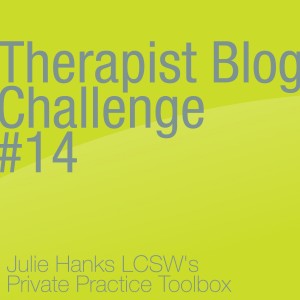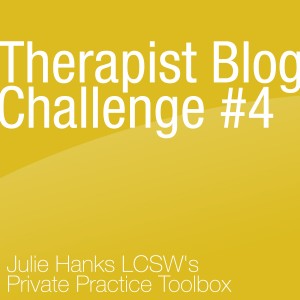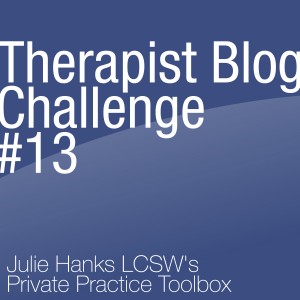 Therapist blog challenge #14 topic focuses on when to ask for and to consider feedback about a significant other.
Therapist blog challenge #14 topic focuses on when to ask for and to consider feedback about a significant other.
[Headline] Come up with a catchy title for your blog post. Here are a few examples:
Dating & the Peanut Gallery: What Other People Say About Your Love Life
Tough Critics: What they Really Think About Your Significant Other
To Ask or Not To Ask: Should You Talk to Your Friends About Your Romantic Partner?
[Strong Intro] Lay out the topic with a little more detail. Below is an example.
Should you ask your friends if they like your romantic partner? Should you listen to what they say? What are the pros and cons of getting feedback about your relationships?
Dating relationships can bring complex dynamics: Both parties have family and friends involved in their life who care about their well-being. But things can get tricky when that extends into romantic relationships. Here are things to consider when talking to other people about a romantic partner.
[Scanable Content]
Break your content into smaller, readable sections with a clear sub-heading. For this example, we'll lay out Do's and Don'ts when it comes to asking for and giving relationship feedback/ advice.
When should you ask for feedback?
Write about times when it might be appropriate for person in a relationship to ask for the opinions of other people. Maybe they want an outside perspective of how the relationships looks to others.
When should you not ask for feedback?
Write a short paragraph about when a person shouldn't ask for advice. This might include breaking the confidence of the romantic partner or discussing very personal, intimate details of the relationship.
When should you listen to feedback?
Now, write to a paragraph about when one should seriously consider loved one's feedback about a significant other. For example, if several loved ones share similar warning signs those should be taken into consideration. Or if "He/she is a great fit for you."
When should you not listen to feedback?
Write a paragraph about when a person should refrain from trusting loved one's feedback about their romantic partner. You could explore who's feedback you should not take into consideration, and what types of feedback you should dismiss. For example, it's never a good idea to listen to superficial concerns about someone's looks or chosen profession.
[Strong ending paragraph] The final paragraph wraps up your post and can include a summary of important points, additional resources, and a call to action, such as "Call today for a therapy consultation."
That's all folks. Get going.
Here are a few additional reminders about the blog challenge:
- Write and post your blog article in the next 2 weeks. If you miss the deadline or you read this article months later, that’s OK too.
- Post a link for this blog challenge in the comment section of this blog post.
- Read, comment, and share other therapist’s articles.
- Tweet your post using hashtag #therapistblog and tag @julie_hanks so I can retweet it.
- Pin it on the challenge Pinterest Board. I’ve invited everyone who posted a comment on the initial blog challenge post as collaborators so you can pin onto the group board.
- Spread the word and invite mental health colleagues to join the challenge. Articles can be added anytime throughout the year.
- Write no more than 600 words, make it easy to read, use a conversational tone, and gear your articles toward your ideal client (not other professionals).
- The goal of a professional blog is to provide value to your website visitors, help them get to know your professional perspective, increase traffic to your private practice website, and build your practice.
Here's a list of previous blog challenges. Jump in anytime!
Therapist Blog Challenge #13: Mental Health and Parenting
The therapist blog challenge is back! I'm making it easy to blog regularly as a practice building strategy.
Rather than start a new challenge, I've decided to pick up where we left off last year -- with challenge #13. If you are new to the challenge, you can start with challenge #1 or you can start with this current challenge. The goal of the challenge is to make it easier for you to blog regularly on your private practice website. Blogging can boost SEO, provide valuable information on your specialty areas, lets potential clients get to know you better, and establishes you as an expert. These factors can lead to more clients choosing your practice.
A good way to select a blog topic is to break down broad topics into smaller chunks. For example, mental health is an enormous subject, so focus and expand an aspect of it for one blog post. You can also turn this broad topic into a series of posts. For this example, we'll choose how mental health affects parenting.
[Headline] Here are three title suggestions that you may use or come up with a clear and catchy blog post title
4 Ways to Boost Your Mental Health and Improve Your Parenting
The Mental Health and Parenting Connection
Mind Your Mental Health: Your Children Will Thank You
[Strong intro] You can start with the paragraph below or customize it.
Like all other aspects of health, mental health can affect your parenting. For example, parents who suffer from Bipolar Disorder are 10 times more likely to overreact, which can lead to inappropriate punishments. Parents who are dealing with depression are often less responsive to their child's emotional cues. Here are some ways to mitigate the effect of mental health problems with regards to parenting:
[Scanable content] Make your content easy to quickly scan and find the main points.
1) Physical self-care
Write a paragraph about the importance of self-care for mental health treatment and prevention. You may want to include meditation, nutrition, rest, exercise. Emphasize the connection between physical health, mental health, and relationships. Self-care is critical prevention for parenting "meltdowns."
2) Remain calm
Write a paragraph about a skill parents can use to calm themselves when their child's behavior is difficult. You may want to share counting to 10, putting yourself in "time out", the importance of modeling emotional regulation skills for the child. When parents remain calm, children will become less emotionally reactive.
3) Treatment compliance
Write a paragraph about the importance of remaining in treatment and of following recommendations. This might include medication compliance, group therapy, family therapy, bibliotherapy, etc.
4) Playtime
Write a paragraph about the importance of play and recreation (re-creation) with their child, how play promotes positive attachment, and the mental health benefits of play for adults.
Add as many additional suggestions on how parents can take care of their mental health in ways that support successful parenting.
[Strong ending paragraph] Final paragraph can include a summary of important points, additional resources, and a call to action like "Make an appointment with Julie today!"
That's it! Read on for tips on sharing your blog article.
Additional reminders about the blog challenge:
- Write and post your blog article in the next 2 weeks. If you miss the deadline or you read this article months later, that’s OK too.
- Post a link for this blog challenge in the comment section of this blog post.
- Read, comment, and share other therapist’s articles.
- Tweet your post using hashtag #therapistblog and tag @julie_hanks so I can retweet it.
- Pin it on the challenge Pinterest Board. I’ve invited everyone who posted a comment on the initial blog challenge post as collaborators so you can pin onto the group board.
- Spread the word and invite mental health colleagues to join the challenge. Articles can be added anytime throughout the year.
- Write no more than 600 words, make it easy to read, use a conversational tone, and gear your articles toward your ideal client (not other professionals).
- The goal of a professional blog is to provide value to your website visitors, help them get to know your professional perspective, increase traffic to your private practice website, and build your practice.
Therapist Blog Challenge #4: Answer An FAQ

One quick and easy way to generate content for a blog post is to answer a frequently asked question
What questions do you get asked over and over again about your practice? The questions can be about your therapy approach, about therapy in general, or specific a question about your practice. Make a list of common questions, choose one question and write your answer...and voila! You have a new blog post.
Here are a some sample questions to choose from or feel free to come up with on of your own:
- How do I know if a therapist is the "right fit" for me?
- Do you work with my insurance?
- How do I know if I need therapy?
- Is therapy confidential?
- I think my partner is depressed. How do I get my partner to go and see a therapist?
- My daughter is losing weight quickly. Could she have an eating disorder?
- What's the difference between a therapist and a coach?
- How does talking to a therapist differ from talking with a friend?
- How long does therapy take?
- How will I know when I'm done with therapy?
Ok, colleagues. This challenge is so easy. Let's get blogging! I'm excited to read what you come up with.
Additional reminders about the 2013 blog challenge
- Write and post your blog article in the next 2 weeks. If you miss the deadline or you read this article months later, that’s OK too.
- Post a link for this blog challenge in the comment section of this blog post.
- Read, comment, and share other therapist’s articles.
- Tweet your post using hashtag #therapistblog and tag @julie_hanks so I can retweet it.
- Pin it on the challenge Pinterest Board. I’ve invited everyone who posted a comment on the initial blog challenge post as collaborators so you can pin onto the group board.
- Spread the word and invite mental health colleagues to join the challenge. Articles can be added anytime throughout the year.
- Write no more than 600 words, make it easy to read, use a conversational tone, and gear your articles toward your ideal client (not other professionals).
- The goal of a professional blog is to provide value your website visitors, help them get to know your professional perspective, increase traffic to your private practice website, and build your practice.
Content Creation Opportunities For Shrinks
Writing articles for high-traffic websites can help you grow online presence and your practice.
Content creation is crucial for building an online presence, particularly on your own professional blog on your private practice website. In addition to creating content for your own small website, you may want to start strategically writing for other websites, too. Seek out higher-traffic sites to write for
If the thought overwhelms you, don't stop reading quite yet. Some of the benefits of writing or blogging on other sites as part of your private practice marketing strategy are:
- Getting more back links to your own site which increases traffic and boosts SEO
- Increase name/brand recognition
- More credibility as a trusted expert
- Opportunity to educate and build awareness of important issues
- And best of all, you can re-purpose the content and post it on your own website
All of these benefits will help bring more visitors to your website, which will, over time, mean more clients for your practice. It's important to write on topics directed to your ideal client. Write on your areas of passion and expertise in order to bring in clients that are a good fit for your practice. Writing articles for other websites does take some commitment, but in my experience, it has been well worth the effort.
Consider pitching articles or blogs to these sites:
About.com
About.com has different levels of paid contributors: guides, topic writers, and video producers.
Psych Central
If you're ready to make a regular commitment to create and write regularly for your own blog, pitch your passion here. you can also submit individual articles to PsychCentral's World Of Psychology blog.
Sharecare.com
Sharecare is a health social media site owned by Dr. Oz. You can sign up as an expert and answer questions on a variety of health and mental health questions. Here's my Sharecare page.
Your local news website
Every newspaper and TV news station have websites and I've yet to come across one that doesn't have additional bloggers contributing. Here's an example from my articles on a local Utah news website
Examiner.com
The Examiner accepts bloggers based on specific topics and locations. See if they are looking for bloggers in your area of expertise.
Professional organization websites
Check with your professional organization to see if they have a blog and accept articles from licensed professionals. The American Counseling Association has a blog with contributors.
GoodTherapy.org
This professional therapist listing site also allows therapists to become "topic experts" on their site and publish blog articles.
This is by no means an exhaustive list of all of the writing opportunities for therapists on the web. My hope was to get you thinking about how to build your online presence and create content that you own and can reuse on your own site.
Do you contribute articles or other content to larger websites? I'd love to hear about your experience. Have you noticed an increase in traffic to your site? What benefits have you experienced writing for big websites?
I've just launched the 2013 Therapist Blog Challenge. Join us!



As healers, we genuinely like to do our work. Guiding clients through the therapy process and seeing them make progress is why we do what we do. But if you're in private practice, you know there's a lot going on in the back end and that it's crucial to run an efficient and organized business.